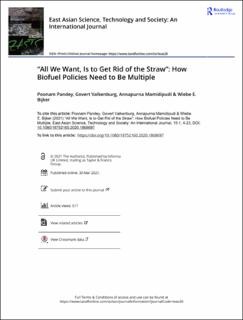| dc.contributor.author | Pandey, Poonam | |
| dc.contributor.author | Valkenburg, Govert | |
| dc.contributor.author | Mamidipudi, Annapurna | |
| dc.contributor.author | Bijker, Wiebe Eco | |
| dc.date.accessioned | 2022-02-16T10:06:09Z | |
| dc.date.available | 2022-02-16T10:06:09Z | |
| dc.date.created | 2021-01-25T15:51:33Z | |
| dc.date.issued | 2021 | |
| dc.identifier.citation | East Asian Science, Technology and Society: an International Journal. 2021, 15 (1), 4-23. | en_US |
| dc.identifier.issn | 1875-2160 | |
| dc.identifier.uri | https://hdl.handle.net/11250/2979301 | |
| dc.description.abstract | Second-generation (2G) biofuels are promoted worldwide as remedy to sustainable-energy challenges in the transport sector and as response to the criticism of first-generation biofuels. By utilizing agriculture and forest residues, 2G biofuels claim to support agricultural livelihoods and boost rural economies. Quantitative estimates exist of the availability of “waste” or “unused” or “surplus” biomass that could be fed into producing bioenergy. Most of current discourse on 2G bioethanol is about developing efficient technologies and supportive policies for biomass utilization and energy distribution, while availability and supply of that biomass are often taken for granted. This paper challenges these presumptions of biomass availability and technological feasibility. Following a social-constructivist analysis of technology and focusing on how political actors, scientists, industry, green-revolution and organic farmers envision biomass, this paper argues that the innovation for 2G is hybrid and complex, rather than merely logistical and economic. Biomass as feedstock is not an off-the-shelf commodity, but a dynamic and fluid entity, the availability of which is dependent on a number of cultural, social, technological and economic factors. Policies are needed that recognize the multiplicity of agricultural practices if a sustainable biofuel system is to be developed. | en_US |
| dc.language.iso | eng | en_US |
| dc.publisher | Taylor & Francis | en_US |
| dc.rights | Attribution-NonCommercial-NoDerivatives 4.0 Internasjonal | * |
| dc.rights.uri | http://creativecommons.org/licenses/by-nc-nd/4.0/deed.no | * |
| dc.title | ‘All we want, is to get rid of the straw’: How biofuel policies should need to be multiple | en_US |
| dc.type | Peer reviewed | en_US |
| dc.type | Journal article | en_US |
| dc.description.version | publishedVersion | en_US |
| dc.source.pagenumber | 4-23 | en_US |
| dc.source.volume | 15 | en_US |
| dc.source.journal | East Asian Science, Technology and Society: an International Journal | en_US |
| dc.source.issue | 1 | en_US |
| dc.identifier.doi | 10.1080/18752160.2020.1868697 | |
| dc.identifier.cristin | 1878733 | |
| cristin.ispublished | false | |
| cristin.fulltext | original | |
| cristin.qualitycode | 1 | |

